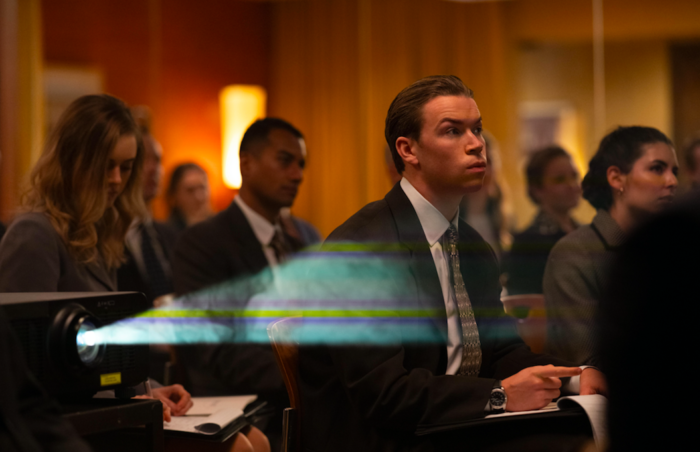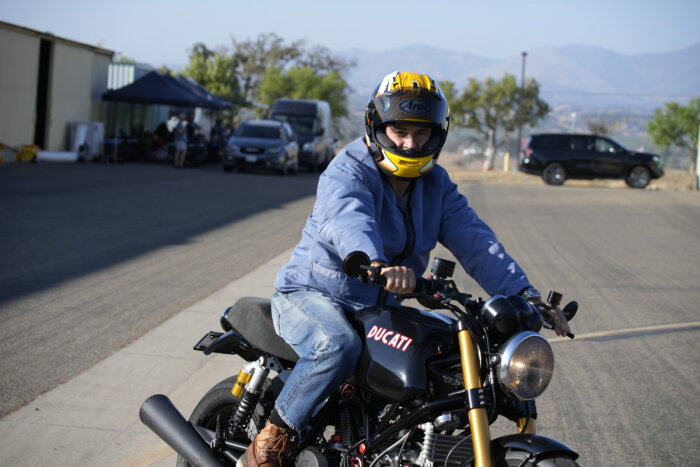“In many ways, the show is the trial that never happened.”
Writer Danny Strong has been interested in the starts and effects of the opioid epidemic, or more so, the tragic outcomes of one companies’ greed and deceit when it came to OxyContin for some time. That interest became outrage however, after being approached to write on the subject matter, and realizations were made when digging deeper into the opioid crisis that swallowed the country.
“I had been so outraged and shocked by the story—one Pharma company that was micromanaged by its owners, a family, was able to be so deceitful and so dishonest in selling this highly addictive narcotic,” explains Strong. “Through their deception, they made billions from the opioid crisis. I was blown away by that. By that point, I thought I’ve got to figure out a way to do this.”

When Strong came across information surrounding a case and a full investigation made by the Assistant US Attorney in 2007, that’s when the idea for the TV series began to formulate in his head. Then, when he came across accounts of the DEA going after that Pharma company, Purdue in 2001-2002, the storyline began to form. “It had the makings for what could be a really dynamic show to simultaneously show the crimes of this company,” he explains.
However, ‘Dopesick’ isn’t just a crime-based thriller. It shows every entryway into the subject of OxyContin: From the Sackler family who knowingly decided to lie and convince doctors that the drug was safe, to the doctors who were duped (enter Michael Keaton’s character), to the patients who became hooked (enter Kaitlyn Dever), to the reps who were on a moral carousel of sorts between truth and ambition (enter actor Will Poulter.)
In ‘Dopesick’ Poulter plays one of the many Purdue reps who pushed for the drug while simultaneously checking their morality at the door. Was it intentional? For money and success, of course it was. But was it something they fully grasped? That’s where the debate lies.
“For me, one of the things that was really interesting about this role and a big part of my desire to play Billy was managing the moral battle that existed in being a Purdue rep and wanting to do good and succeed, but realizing the two things couldn’t happen at once. It was very clear at a certain stage that in order to succeed at Purdue, you had to park any real kind of morally astute and responsible intentions and you had to board a pretty unethical train headed towards a bountiful and luxurious lifestyle. That was very enticing for a lot of young, ambitious people who joined the company,” explains Poulter.
“It’s interesting. I think he probably—like a lot of people—went to work for Purdue with the intention of doing good and contributing to this effort to relieve America of its pain and revolutionize pain relief. I think inevitably at some point along the way, Purdue Pharma reps would have had to reckon with the truth which was that Purdue was peddling lies and fraudulently promoting this drug as non-addictive when it was actually highly addictive and dangerous.”

As we see in the show, there were huge amounts of money and bonus structures that were highly unethical to get this drug out there and into the grasps of many people that were being dangled like carrots of gold out in front of the reps by Purdue. With Poulter’s character, we see him interacting with Keaton’s Dr. Samuel Finnix on a regular basis in a small coal town in West Virginia. Finnix, like Poulter’s Billy is a composite of a few real people, but what he represents is a doctor wanting to help patients ethically, but is being lied to about just how addictive the drug being pushed is. The real effects of the drug were masked by gifts and promises, and even a ‘Pitch and Pump’ tactic where reps would pitch doctors while filling up their cars with gas.
“Reps were encouraged to buy gifts for the receptionists to get in the door and bribe them to dinner or give them tickets—all company expensed,” explains Poulter. “There was no end to the bribery in many ways, which they attempted to gain favor with doctors, ultimately for making more money and selling the drugs at any cost.”
We see the reps interacting with doctors and at some points even the DEA (enter Rosario Dawson.) All the storylines intertwine. As Strong says, it was a really complicated storyline to put together because his goal for it was really ambitious. To do four different storylines, where three of them take place in different time periods and are intertwining—it’s a high bar. From the people who produced the drug, to those who sold it, to those who prescribed it, abused it and then tried to clean up the mess after. Those stories all needed to be told to get a full grasp of just how outrageous this all was according to Strong…and it happened on a national stage.
“It got to a point where I stopped being shocked because everything shocked me so much,” Strong explains. “There was so much lying, so much deception and it was so brazen at times and so flagrant and so criminal—so much so that they [Purdue] pled to criminal misbranding as a company in 2007. They plead guilty to escaping facts that are quite damning. Now, the playbook has always been ‘pretend it didn’t happen, minimize and keep selling.’ Even after pleading guilty to a felony charge and the execs pleading guilty to misdemeanors—that was also seen as one of the great tragedies for many activists. They weren’t tried on felony convictions and there was a feeling like that might have actually changed Purdue’s behavior. ”
However, in that settlement, the prosecutor put oversights and safeguards so that Purdue couldn’t continue on this path…but Purdue and the Sackler family ignored it. They pled guilty to $9 billion in three separate charges.
So, how could this happen?

“You can sum it up in one word—money,” continues Strong. “Lawyers at influence, donations Purdue made to congressmen and senators that would protect them. People that are supposed to oversee them in the FDA and justice department were hired by Purdue.”
Both Strong and Poulter hope there are some positive outcomes from the show. As we see towards the end of ‘Dopesick,’ there are treatments available for those who’s lives were/are affected by opioids. There’s also a hope for some sort of understanding or empathy that may come along with watching this miniseries.
“Understanding how it came to be and how it takes hold, hopefully it increases empathy for people who do suffer from addiction. Ultimately, people who end up in that scenario were very often seeking pain relief…they were taken advantage of,” says Poulter.
For those who were there from the start, Strong and even Beth Macy, who wrote the book the series is inspired by, this is more so an acknowledgment to Purdue and the Sackler family that they know what they did, and soon, so will everyone else.
“I want people who became addicted to Oxycontin and were taking it for an injury and then lost a decade of their life to drug addiction, or for people who lost their kid or their family members to overdoses, or a teenager that took a pill at a party and then died—I want them to know what happened,” says Strong. “I want them to know what Purdue did and that someone has documented their crimes to the public so that they know everyone else knows.This is a criminal organization, this is a criminal company and it’s unbelievably outrageous. To be able to document their crimes for the audience is a necessary thing for history and for the public to truly understand what they did.”
‘Dopesick’ premieres on Hulu Oct. 13.































